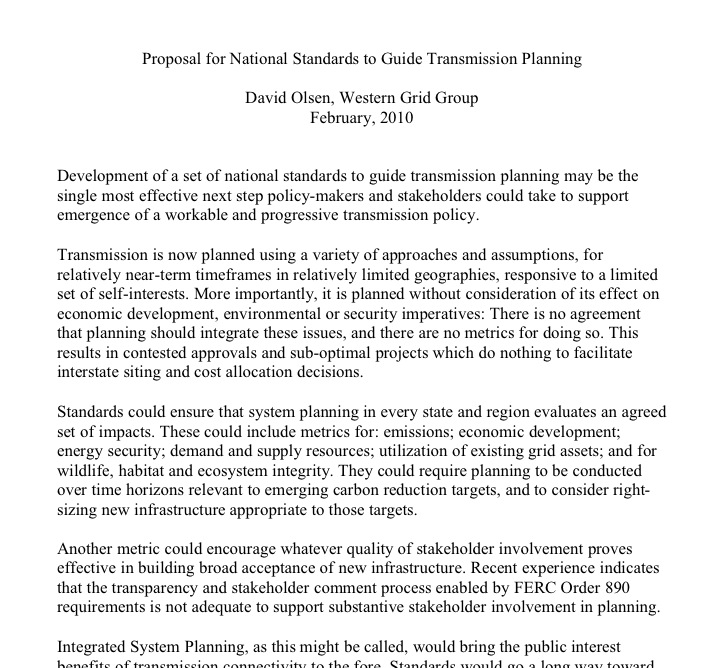David Olsen, Western Grid Group; February, 2010
Development of a set of national standards to guide transmission planning may be the single most effective next step policy-makers and stakeholders could take to support emergence of a workable and progressive transmission policy.
Transmission is now planned using a variety of approaches and assumptions, for relatively near-term timeframes in relatively limited geographies, responsive to a limited set of self-interests. More importantly, it is planned without consideration of its effect on economic development, environmental or security imperatives: There is no agreement that planning should integrate these issues, and there are no metrics for doing so. This results in contested approvals and sub-optimal projects which do nothing to facilitate interstate siting and cost allocation decisions.
Standards could ensure that system planning in every state and region evaluates an agreed set of impacts. These could include metrics for: emissions; economic development; energy security; demand and supply resources; utilization of existing grid assets; and for wildlife, habitat and ecosystem integrity. They could require planning to be conducted over time horizons relevant to emerging carbon reduction targets, and to consider right- sizing new infrastructure appropriate to those targets.
Another metric could encourage whatever quality of stakeholder involvement proves effective in building broad acceptance of new infrastructure. Recent experience indicates that the transparency and stakeholder comment process enabled by FERC Order 890 requirements is not adequate to support substantive stakeholder involvement in planning.
Integrated System Planning, as this might be called, would bring the public interest benefits of transmission connectivity to the fore. Standards would go a long way toward establishing a consistent basis for spreading the costs of backbone facilities widely, across states. As with the Ozone Transport Commission, standards could provide a framework for planning that still affords real flexibility to states.
In the absence of national energy and environmental goals, a focus on standards might offer the most effective way to make progress toward overcoming siting and cost allocation barriers.
National standards may best be established by FERC, through a proceeding dedicated to the issue. FERC Technical Conferences convened around the country in such a proceeding could provide the forum for national discussion of the issues appropriate to be included in planning and suggest guidelines for the development of standards. By framing generation-transmission development in terms of broad public interests in economic development, environmental protection and energy security, such discussion could itself help advance the federal and interstate cooperation needed to resolve key transmission policy issues.

